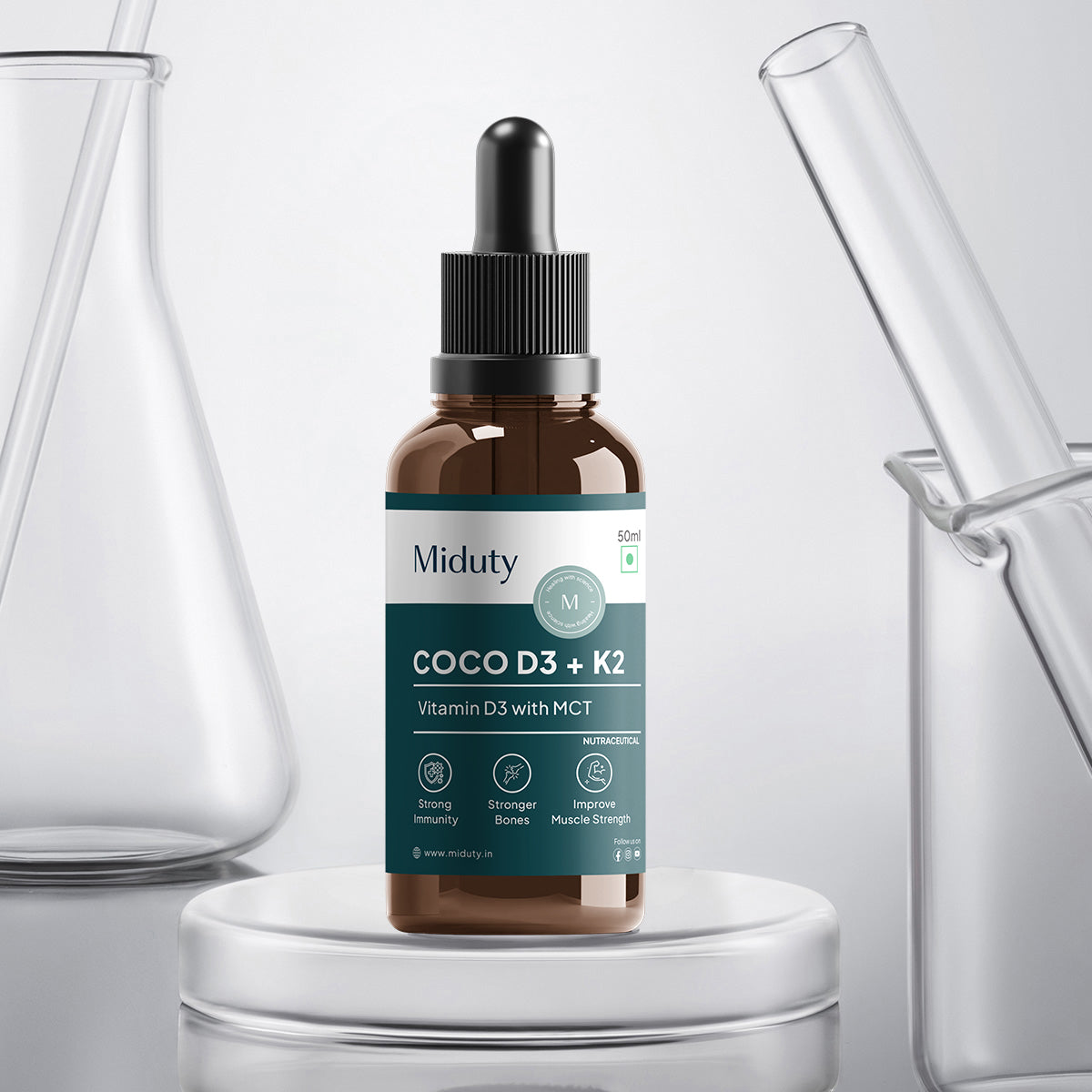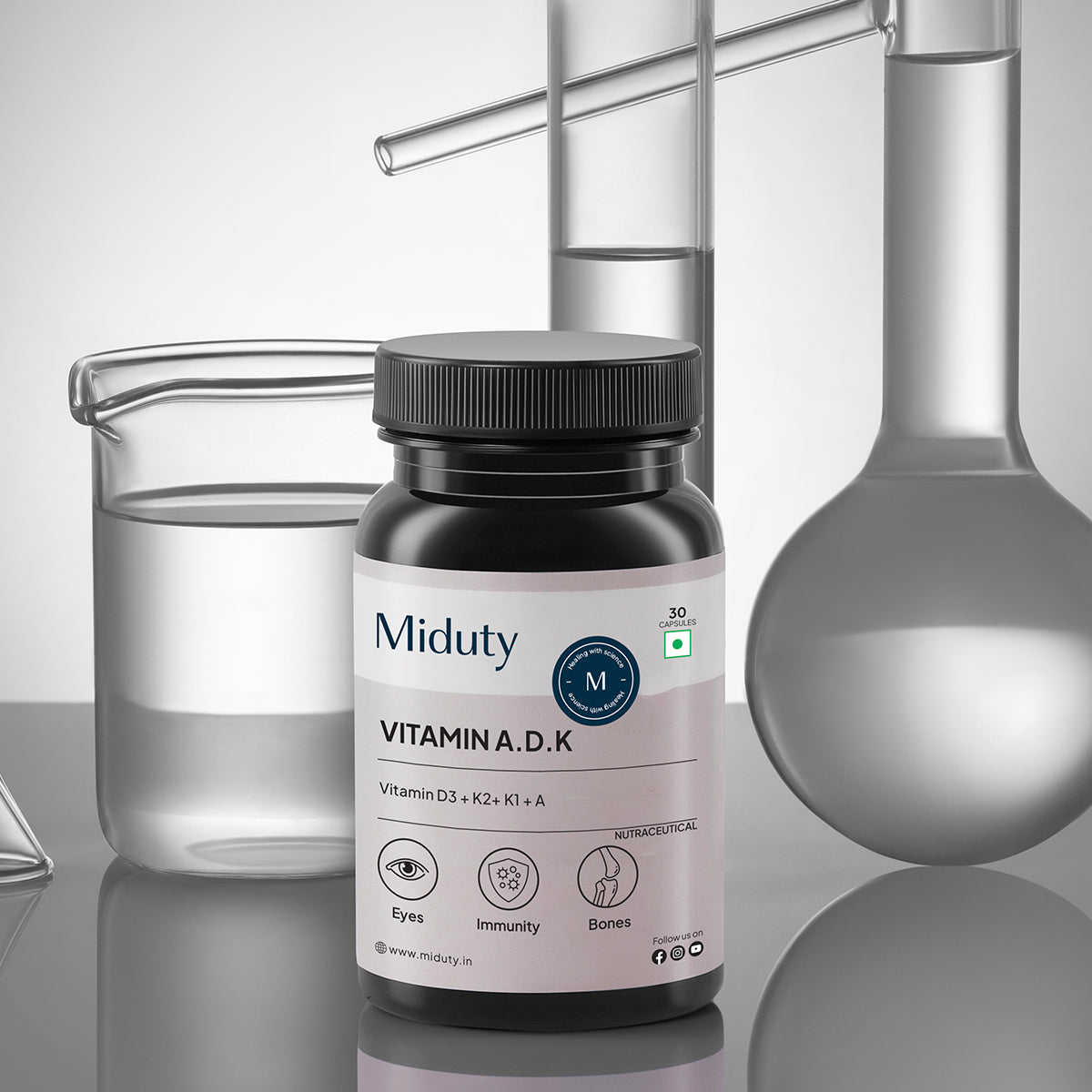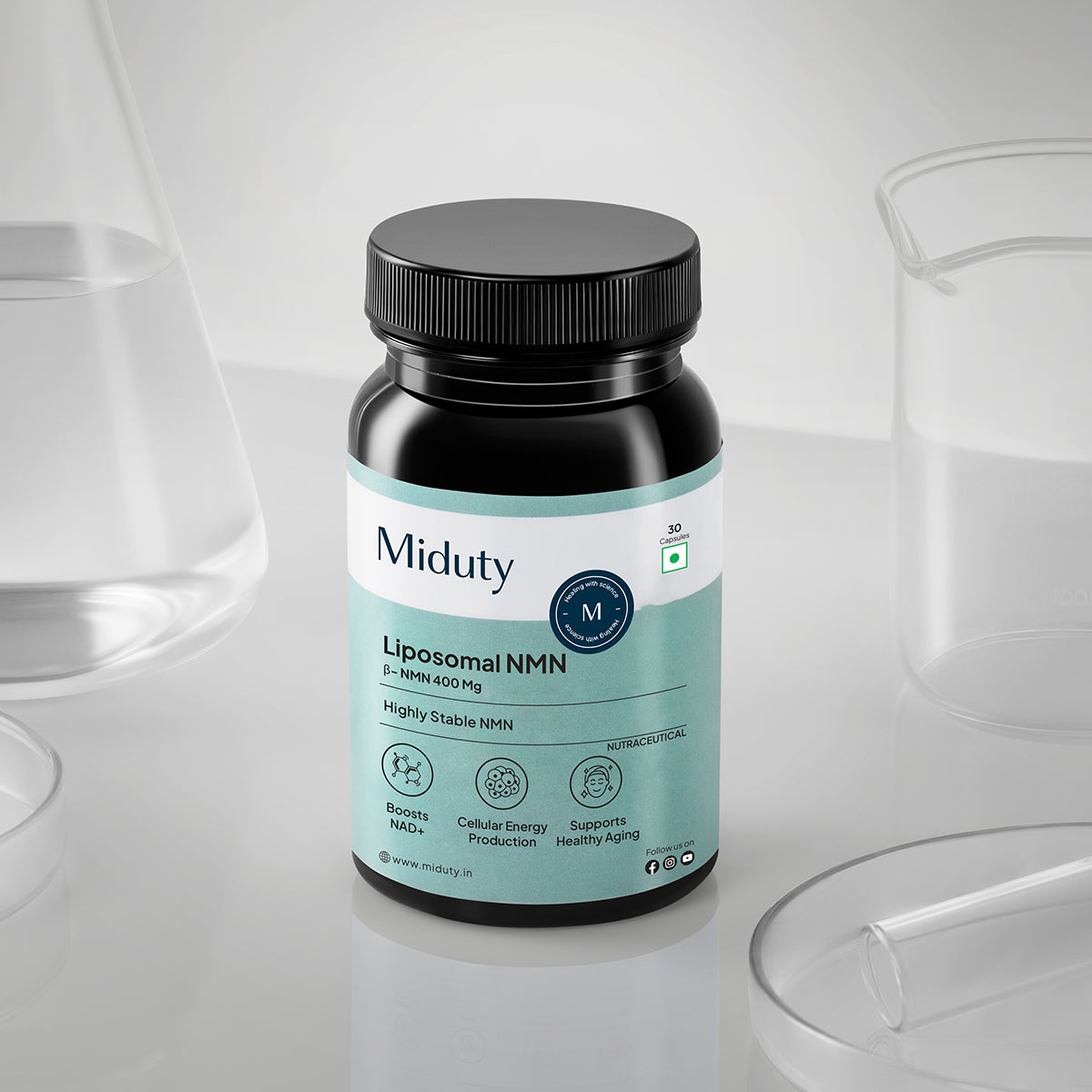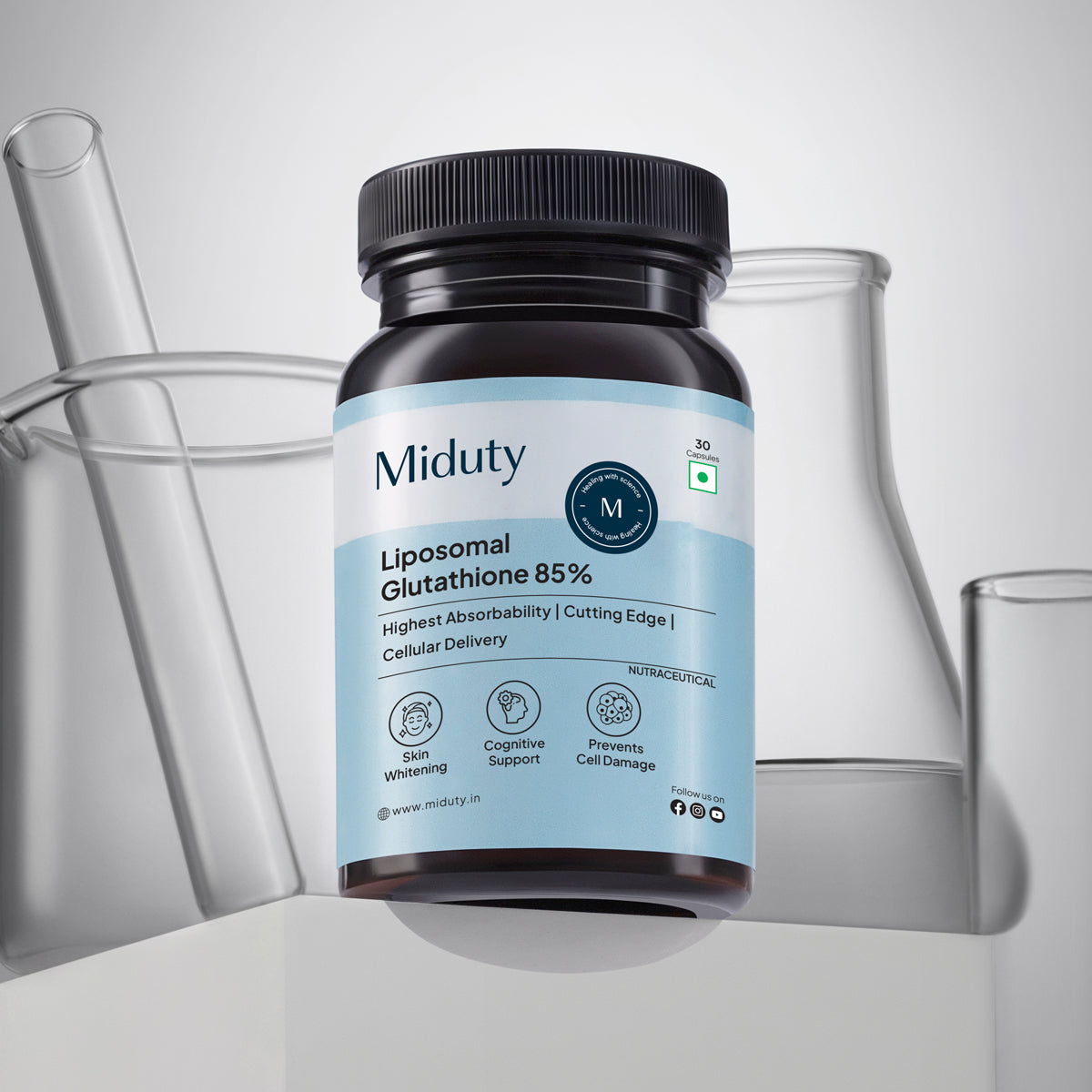
How Vitamin D3 and K2 Work Together: The Synergy Between The Two
When it comes to staying healthy, most of us know the importance of getting enough vitamins and minerals. But did you know that some nutrients work best as a team rather than on their own? That's exactly the case with Vitamin D3 and Vitamin K2—a powerhouse duo that plays a vital role in keeping your bones strong, your heart protected, and your body functioning at its best.
Think of Vitamin D3 as the "gatekeeper" that helps your body absorb calcium, and Vitamin K2 as the "traffic controller" that makes sure all that calcium goes to the right places like your bones and teeth instead of clogging up your arteries. On their own, each vitamin has incredible benefits, but together, they're like the perfect tag team for long-term health.
In this blog, we'll dive into what Vitamin D3 and K2 actually are, explore their individual benefits, uncover why they're stronger together, and share tips on choosing the best supplement to support your daily wellness
Key Takeaways
1. Vitamin D3 is the "gatekeeper" – it helps your body absorb calcium, keeping your bones strong and supporting immunity, mood, and muscle function.
2. Vitamin K2 is the "traffic controller" – it directs calcium to your bones and teeth while keeping your arteries clear and your heart protected.
3. Together, D3 + K2 are a powerhouse duo – they optimize calcium use, boost bone density, and safeguard cardiovascular health.
4. The right supplement matters – always choose Vitamin D3 (cholecalciferol) and Vitamin K2 in the MK-7 form for maximum effectiveness.
5. Lifestyle makes a difference – combine supplements with a balanced diet, regular exercise, and moderate sun exposure for lifelong bone and heart health.
What is Vitamin D3?
Vitamin D3, also known as cholecalciferol, is a fat-soluble vitamin that is naturally produced in the skin when exposed to sunlight. It can also be obtained from certain foods like fatty fish, egg yolks, and fortified products, as well as dietary supplements. Vitamin D3 is a biologically active form of vitamin D that plays a vital role in regulating calcium and phosphorus levels in the body, supporting bone health, and enhancing immune function.
Benefits of Vitamin D3
1. Supports Bone Health
Vitamin D3 promotes calcium absorption in the gut, which is critical for building and maintaining strong bones. A deficiency can lead to soft or brittle bones, increasing the risk of osteoporosis and fractures, especially in older adults. By ensuring sufficient calcium availability, Vitamin D3 helps maintain bone density over time and supports the structural integrity of the skeletal system, which is essential for overall mobility and reducing the risk of age-related bone issues. [1]
2. Boosts Immune System
Vitamin D3 enhances the function of immune cells, helping the body fight infections and reduce inflammation. Adequate levels have been linked to a lower risk of respiratory illnesses and autoimmune disorders. Moreover, Vitamin D3 modulates the immune response, promoting a balanced reaction to pathogens and preventing overactive immune reactions that can lead to chronic inflammation or autoimmune complications.
3. Enhances Mood and Cognitive Function
Low vitamin D3 levels are associated with mood disorders like depression and cognitive decline. Regular supplementation may improve mental well-being and brain health. Additionally, Vitamin D3 supports the production of neurotransmitters such as serotonin, which influence mood regulation, memory, and cognitive performance, making it important for emotional balance and mental clarity. [2]
4. Supports Muscle Function
Vitamin D3 is also essential for proper muscle function, reducing the risk of falls and injuries, particularly in the elderly. Adequate levels help improve muscle strength and coordination, supporting physical performance and enabling individuals to stay active and independent, which is particularly crucial for aging populations to maintain a healthy, mobile lifestyle. [3]
What is Vitamin K2?
Vitamin K2, also called menaquinone, is a fat-soluble vitamin primarily found in fermented foods such as natto, certain cheeses, and some meats. Unlike Vitamin K1, which mainly supports blood clotting, K2 plays a crucial role in calcium regulation, ensuring that calcium is directed to the bones and teeth rather than soft tissues like arteries and organs.
Benefits of Vitamin K2
1. Promotes Bone Strength
Vitamin K2 activates osteocalcin, a protein that binds calcium to the bone matrix. This process is essential for maintaining bone density and preventing fractures. By ensuring that calcium is efficiently integrated into bones, K2 supports skeletal development in younger individuals and preserves bone mass as we age, making it a key nutrient in reducing the risk of osteoporosis and brittle bones. [4]
2. Supports Cardiovascular Health
K2 prevents calcium buildup in the arteries, a process called vascular calcification, reducing the risk of heart disease. By directing calcium to bones instead of arteries, K2 helps maintain a healthy cardiovascular system. This not only improves arterial flexibility and circulation but also lowers the chances of arterial stiffness, high blood pressure, and long-term cardiovascular complications.
3. Improves Dental Health
K2 also plays a role in dental health by supporting proper calcium deposition in teeth, contributing to stronger enamel and reducing the risk of cavities. Through its activation of proteins that regulate mineralization, K2 helps teeth become more resilient against decay and structural damage, promoting a naturally stronger and healthier smile.
4. Works as an Antioxidant
Some studies suggest that Vitamin K2 has antioxidant properties, helping protect cells from oxidative stress. This means K2 may reduce cellular damage caused by free radicals, supporting overall health, slowing down aging processes, and potentially lowering the risk of chronic diseases associated with oxidative stress, such as cardiovascular conditions and neurodegenerative disorders.
How Vitamin D3 and K2 Work Together
While both vitamins are beneficial individually, their synergy is particularly remarkable. The relationship between Vitamin D3 and K2 revolves around calcium metabolism. Vitamin D3 increases calcium absorption in the gut, but without sufficient K2, calcium may be deposited in soft tissues like arteries, leading to cardiovascular issues. Vitamin K2 ensures that the calcium absorbed is properly directed to bones and teeth where it is needed.
Benefits of Combining Vitamin D3 and K2
1. Enhanced Bone Health
Together, D3 and K2 optimize calcium utilization. D3 increases absorption, and K2 ensures proper deposition in the bone matrix, strengthening bones and reducing the risk of fractures and osteoporosis.
2. Cardiovascular Protection
K2 helps prevent calcium from accumulating in arteries, while D3 ensures proper calcium levels in the blood. This combination supports arterial flexibility and reduces the risk of heart disease.
3. Improved Muscle Function and Overall Mobility
The duo enhances bone density and calcium regulation, which indirectly supports muscle function, reducing the likelihood of falls or injuries.
4. Anti-Aging Effects
Optimal calcium utilization supports healthy bones and cardiovascular function, contributing to overall vitality and longevity.
How to Choose the Best D3 and K2 Supplement
Selecting the right supplement can make a significant difference in effectiveness. Here are some tips:
1. Look for the Right Forms
Vitamin D3 (cholecalciferol) is preferred over D2 (ergocalciferol) because it is more bioavailable. Vitamin K2 should be in the MK-7 form, which has a longer half-life and remains active in the body longer than MK-4.
2. Check Dosages
Typical D3 doses range from 1,000–5,000 IU per day depending on age, lifestyle, and sun exposure. MK-7 is often effective at 90–200 mcg daily.
3. Opt for Combined Supplements
Products that combine D3 and K2 ensure that you get the correct ratio, supporting optimal calcium metabolism.
4. Verify Quality and Purity
Choose supplements that are third-party tested, non-GMO, and free from unnecessary fillers or additives.
5. Consider Lifestyle Factors
Those with limited sun exposure, lactose intolerance, or dietary restrictions may particularly benefit from a high-quality D3 + K2 supplement.
Additional Tips for Supporting Bone and Heart Health
While D3 and K2 supplementation is powerful, lifestyle choices also matter:
1. Maintain a Balanced Diet: Include calcium-rich foods like leafy greens, nuts, seeds, and fortified plant-based milk.
2. Exercise Regularly: Weight-bearing exercises strengthen bones and improve cardiovascular health.
3. Get Moderate Sun Exposure: Sunlight naturally supports vitamin D production.
4. Avoid Excessive Calcium Supplements: Too much calcium without proper D3 and K2 may increase the risk of arterial calcification.
Conclusion
Vitamin D3 and K2 are a perfect nutritional pair that work together to enhance calcium absorption, support bone density, and protect cardiovascular health. While each vitamin has individual benefits, their synergy ensures calcium goes exactly where it's needed—bones and teeth—while keeping arteries and soft tissues safe.
By choosing a high-quality D3 + K2 supplement, maintaining a balanced diet, and living an active lifestyle, you can support long-term bone, heart, and overall health. This dynamic duo isn't just about preventing deficiencies—it's about optimizing wellness and protecting your body for the years to come.
FAQ's on Vitamin D3 and K2 -
Q1 - How do vitamin D3 and K2 work together?
Vitamin D3 and K2 work synergistically to regulate calcium. Vitamin D3 enhances calcium absorption from the diet, while K2 ensures that calcium is delivered to bones and teeth instead of accumulating in soft tissues such as arteries, where it could be harmful. Together, they support stronger bones and teeth while also protecting cardiovascular health.
Q2 - What do vitamin D3 and K2 do to your body?
Vitamin D3 and K2 work together to promote both bone and cardiovascular health by guiding calcium to where it's needed—your bones—while keeping it out of arteries. Vitamin D3 boosts calcium absorption in the gut, while K2 activates proteins that direct calcium into bone and prevent harmful arterial calcification. In addition, vitamin D3 supports immune function, muscle health, and mood, while vitamin K2 is essential for proper blood clotting.
Q3 - What happens if you take vitamin D3 and K2 every day?
Daily vitamin D3 and K2 supplementation supports bone and heart health by helping the body use calcium efficiently—sending it to bones and keeping it out of arteries. While generally safe, high doses may cause side effects, and those taking medications such as warfarin should exercise caution. Consulting a doctor is recommended to ensure proper dosage and avoid interactions, especially if you have underlying health conditions.
Q4 - How long does it take for vitamin K2 and D3 to work?
It typically takes a few weeks to see improvements from taking vitamin K2 and D3, with mood and energy changes potentially occurring sooner, while measurable bone health or heart health benefits may take several months of consistent daily use. Full effects, such as stable blood levels for Vitamin D, can take 2-6 months.
Q5 - Do vitamin D3 and K2 help with weight loss?
Vitamin D3 and K2 may indirectly support weight management by promoting a healthy metabolism, improving insulin sensitivity, and reducing inflammation, but they are not direct fat burners. Vitamin D3 helps regulate fat cell activity, while K2 directs calcium to bones and away from arteries. Research suggests that maintaining adequate levels of these vitamins is linked to better weight control, though lasting results still depend on a balanced diet and regular exercise.
References













